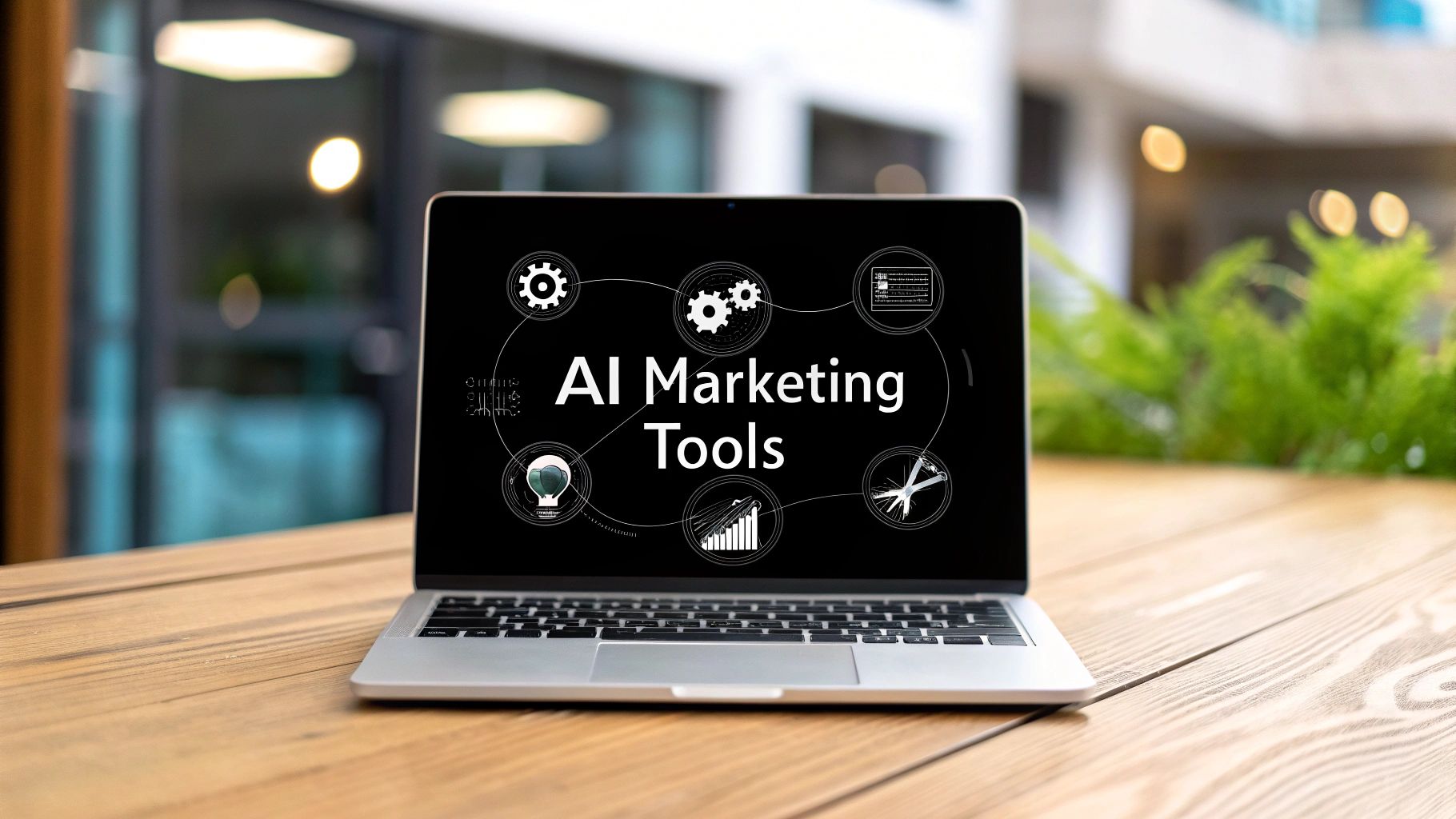In the fast-paced world of B2B SaaS, staying ahead requires more than just a great product; it demands intelligent, efficient marketing. Artificial intelligence has transformed the industry, offering solutions that automate tedious tasks, generate deep data insights, and create personalized customer experiences at scale. But with an overwhelming number of options available, identifying the platforms that deliver real return on investment is a significant challenge. This guide is designed to cut through the noise and provide clarity.
We've meticulously curated a definitive list of the best AI marketing tools specifically for B2B SaaS companies. Forget generic feature lists and promotional fluff. Instead, you’ll find a comprehensive resource detailing practical applications, core features, transparent pricing structures, and an honest assessment of each tool's limitations. Our goal is to help you build a powerful, integrated tech stack that drives measurable growth and secures a competitive advantage. For real-world insights into accelerating an AI B2B SaaS product's growth, you can review a case study on an AI B2B SaaS product's growth.
Each entry in this listicle includes direct links and screenshots to give you a clear view of the user experience. We'll explore everything from content creation with platforms like Jasper and comprehensive automation hubs like HubSpot, to specialized tools for SEO, email, and social media management. This practical guide is your blueprint for choosing the right AI solutions to streamline your workflow and amplify your marketing impact.
1. PimpMySaaS
Best for B2B SaaS Authority Building in Search & AI
PimpMySaaS stands out as a unique and powerful contender among the best AI marketing tools, though it operates as a specialized agency rather than a standalone platform. Its innovative approach leverages Reddit, a massive yet often untapped resource, to strategically build brand authority for B2B SaaS companies. This isn't just about social listening; it's about actively shaping conversations to dominate search engine results pages (SERPs) and, crucially, to get cited as a trusted source by large language models (LLMs) like ChatGPT and Gemini.
The agency’s core strategy involves identifying high-value, low-competition keywords and then creating and engaging in relevant Reddit threads. This process ensures that its clients are naturally woven into discussions where their target audience is actively seeking solutions. The result is a dual-pronged victory: improved Google rankings for competitive terms and prominent placement within AI-generated answers, establishing an unparalleled level of credibility and visibility.
Key Features & Strategic Advantages
PimpMySaaS’s methodology is a masterclass in modern SEO and brand positioning. Instead of just creating content, they engineer influence where it matters most.
- LLM & SEO Synergy: The agency's primary innovation is its focus on getting clients cited by LLMs. This positions a SaaS brand not just as a search result but as an authoritative answer, directly influencing high-intent users interacting with AI.
- Data-Driven Reddit Strategy: They conduct in-depth keyword mapping to find conversational gaps on Reddit that align with client services. This allows for the creation of high-quality, relevant discussions that attract organic upvotes and engagement.
- Transparent Performance Tracking: Clients receive weekly reports detailing keyword ranking improvements, referral traffic from Reddit, and, most importantly, the number of times they are mentioned by major LLMs. This provides clear, measurable ROI.
Practical Use Case & Implementation
A B2B SaaS company offering a project management tool could use PimpMySaaS to target conversations where users are debating alternatives to established players like Asana or Trello. The agency would identify subreddits like r/projectmanagement and create threads such as "What's the best PM tool for agile startups in 2024?" They would then strategically mention and discuss the client's tool, highlighting its unique features.
Over time, as this content gains authority, Google begins to rank it for relevant searches. Simultaneously, LLMs scraping this data start recognizing the client’s tool as a credible solution, incorporating it into answers for prompts like "recommend a Trello alternative." This delivers highly qualified leads and cements the brand's expert status.
Pros:
- Exclusive focus on leveraging Reddit for SEO and LLM visibility.
- Proven track record with over 25 B2B SaaS clients.
- Data-driven approach ensures authentic engagement and measurable results.
- Positions brands at the forefront of AI-driven search and discovery.
Cons:
- Highly specialized for B2B SaaS, may not be suitable for other industries.
- Pricing is not public and requires a direct consultation.
Website: https://www.pimpmysaas.com
2. Jasper
Jasper stands out as one of the best AI marketing tools specifically engineered for marketing teams that prioritize brand consistency. It moves beyond basic text generation to offer a comprehensive suite of features designed to produce on-brand, scalable content for everything from ad campaigns to in-depth blog posts. Its core strength lies in its governance and collaboration capabilities.
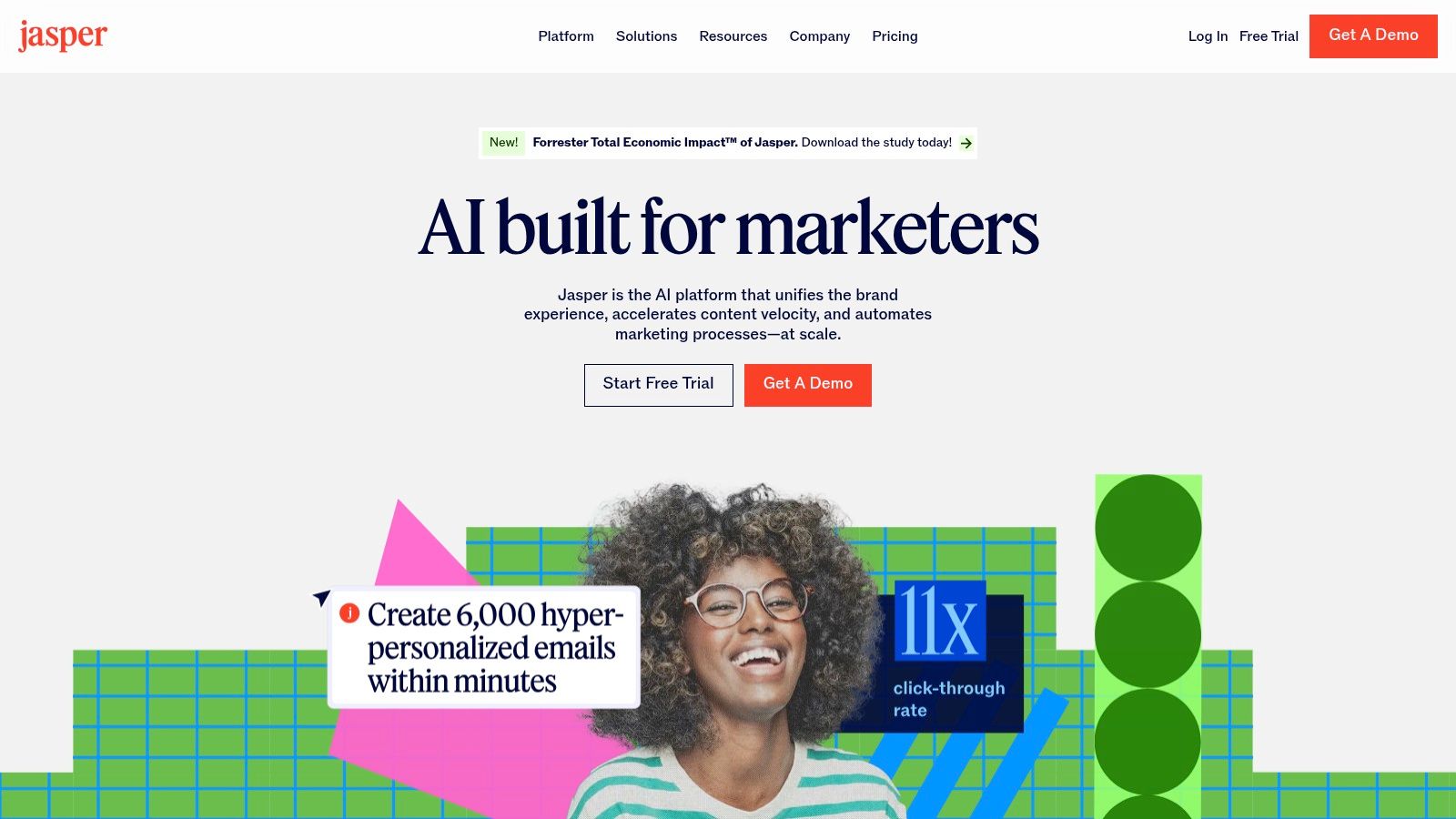
Unlike more generalized AI writers, Jasper's Brand Voice and Knowledge features allow you to train the AI on your specific style guides, product catalogs, and company information. This significantly reduces the need for extensive editing and minimizes the risk of generating off-brand or inaccurate copy, a common challenge with generative AI.
Key Features and Use Cases
- Brand Voice & Knowledge: Upload your style guides, brand messaging documents, and product details to create a centralized knowledge base. This ensures all generated content aligns with your unique brand identity and tone.
- Campaign Canvas: A standout feature that provides a collaborative workspace for creating entire marketing campaigns from start to finish. Teams can brainstorm, draft, and refine assets like emails, social media posts, and ad copy in one unified view.
- Use Case - Scaling Content Production: A B2B SaaS company can use Jasper to quickly generate a dozen variations of ad copy for A/B testing or produce multiple blog drafts based on a single brief, all while adhering to established brand guidelines. This accelerates content velocity without sacrificing quality.
Pros & Cons
- Pro: The user interface is exceptionally clean and marketer-focused, leading to a very short learning curve for new team members.
- Con: The most powerful features, like the no-code AI app builder and advanced enterprise controls, are locked behind the custom Business plan.
Jasper is an excellent choice for marketing teams looking to embed AI into their core workflows while maintaining strict brand control. To get the most out of it, invest time upfront setting up your Brand Voice and Knowledge assets. For more strategies on integrating such tools, you can explore these content marketing best practices.
Website: https://www.jasper.ai
3. HubSpot Marketing Hub
HubSpot Marketing Hub excels as an all-in-one platform that deeply integrates AI capabilities into a mature, comprehensive marketing automation suite. It is designed for businesses that want to consolidate their tech stack and leverage AI within established workflows, from lead generation to customer nurturing. Its primary advantage is connecting every marketing action directly back to the HubSpot CRM, providing a unified view of the customer journey.
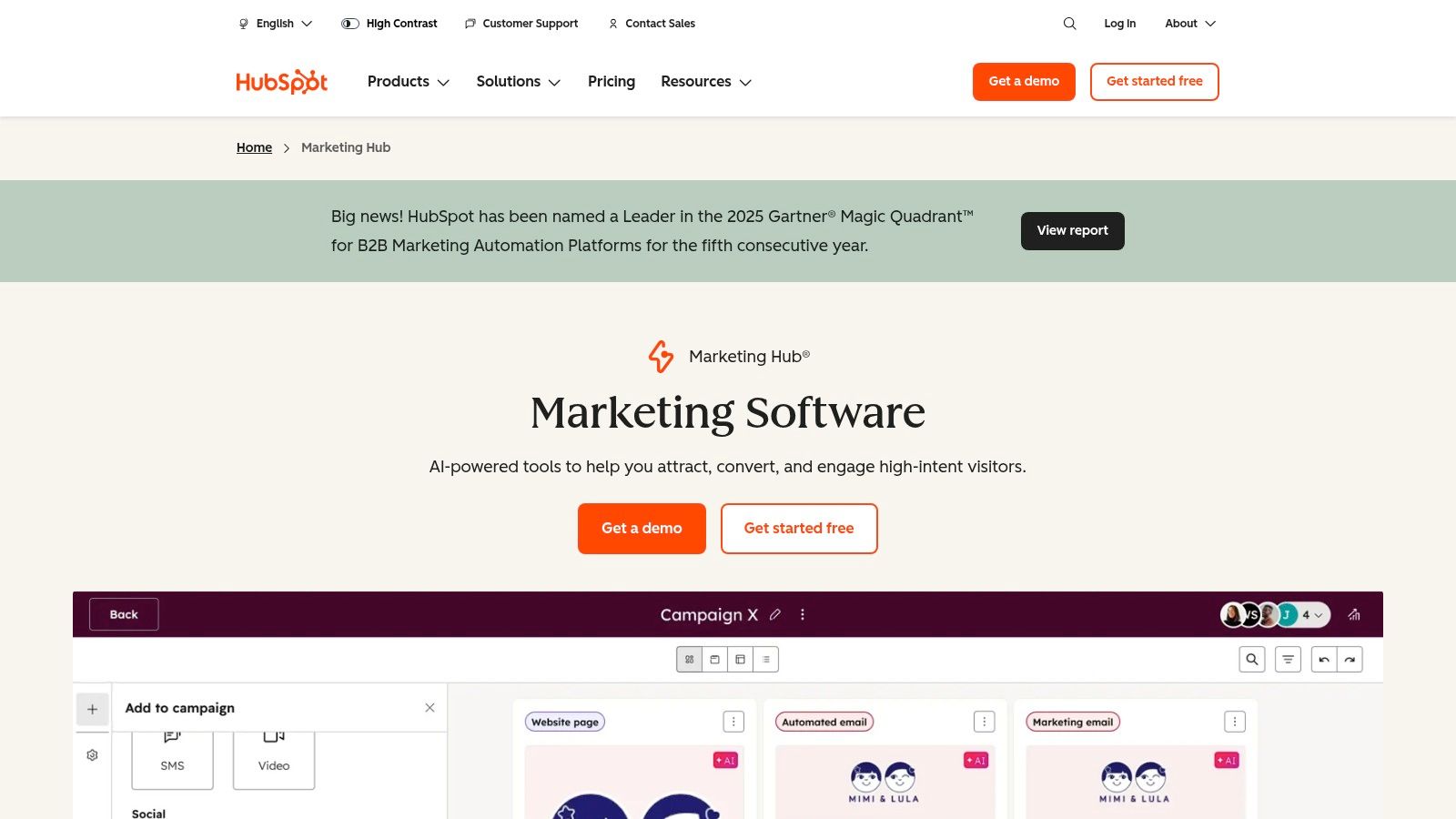
Unlike standalone AI tools, HubSpot embeds features like its AI Content Assistant and predictive analytics directly into the tools marketers already use daily, such as the email editor, social media scheduler, and landing page builder. This contextual integration makes it one of the best AI marketing tools for teams seeking efficiency without adding another disconnected application to their process.
Key Features and Use Cases
- AI Content Assistant: Generate and refine copy for emails, landing pages, and blog posts directly within the editor. It can also create social media posts and even entire marketing campaign outlines based on simple prompts.
- Predictive Lead Scoring: Uses machine learning to analyze customer data and predict which leads are most likely to convert, allowing sales and marketing teams to prioritize their efforts effectively.
- Use Case - Streamlining Inbound Marketing: A SaaS company can use the AI assistant to draft a blog post, then create social media promotional copy from that post. Afterward, they can build a landing page and follow-up email sequence using AI-generated content, all while tracking every interaction in the CRM.
Pros & Cons
- Pro: The all-in-one nature simplifies the tech stack and provides a single source of truth for all customer data and marketing activities.
- Con: Higher-tier plans come with mandatory, costly onboarding fees, and pricing scales with the number of marketing contacts, which can become expensive for growing businesses.
HubSpot Marketing Hub is ideal for organizations committed to an inbound strategy that want to infuse AI into a proven, integrated system. To maximize its value, leverage the vast HubSpot Academy resources to train your team on its extensive features.
Website: https://www.hubspot.com/products/marketing
4. Semrush
Semrush solidifies its position as one of the best AI marketing tools by integrating powerful AI features into its already comprehensive SEO and market intelligence suite. Rather than being a standalone AI writer, Semrush embeds AI to enhance existing workflows, making it a go-to platform for data-driven marketers. Its key advantage is combining vast competitor and market data with AI-powered content creation and optimization capabilities.
Unlike tools focused solely on content generation, Semrush uses AI to analyze top-ranking content and provide actionable recommendations. The platform's AI assists in everything from generating topic ideas based on competitor gaps to rewriting copy for better SEO performance, directly within the tools you already use for keyword research and site audits. This holistic approach helps connect AI-driven actions to tangible marketing outcomes.
Key Features and Use Cases
- ContentShake AI: An app that helps generate content ideas, create outlines, and write SEO-friendly articles optimized for specific keywords, leveraging Semrush's competitive data.
- Ad Copy Generation: Within its advertising toolkit, AI tools assist in creating compelling copy for PPC ads, analyzing competitor ads to inform creation and improve click-through rates.
- Modular Toolkits: Users can purchase toolkits for SEO, Content, Social Media, and Local SEO separately, allowing for a more customized and cost-effective approach based on specific team needs.
- Use Case - SEO Content Strategy: A B2B tech company can use Semrush to identify high-value keywords, analyze the SERPs, and then use ContentShake AI to draft a blog post that is structured to outperform existing top-ranking pages.
Pros & Cons
- Pro: The modular pricing structure is highly flexible, allowing companies to pay only for the specific toolkits they need, from SEO to social media.
- Con: Costs can escalate quickly when purchasing multiple toolkits or adding seats for a growing team, and some AI features have credit-based usage limits.
Semrush is ideal for marketing teams that want to supercharge their existing SEO and competitive analysis efforts with AI. To maximize its value, start by integrating the AI writing assistants into your established keyword research and content audit processes.
Website: https://www.semrush.com
5. Intuit Mailchimp
Intuit Mailchimp has evolved from a simple email service into a robust marketing automation platform that now incorporates powerful generative AI. It's an excellent entry point for businesses, especially SMBs, looking to leverage AI in their email and SMS marketing without the complexity of more enterprise-focused tools. Its strength lies in its user-friendly interface and integrated AI assistants that streamline content creation.
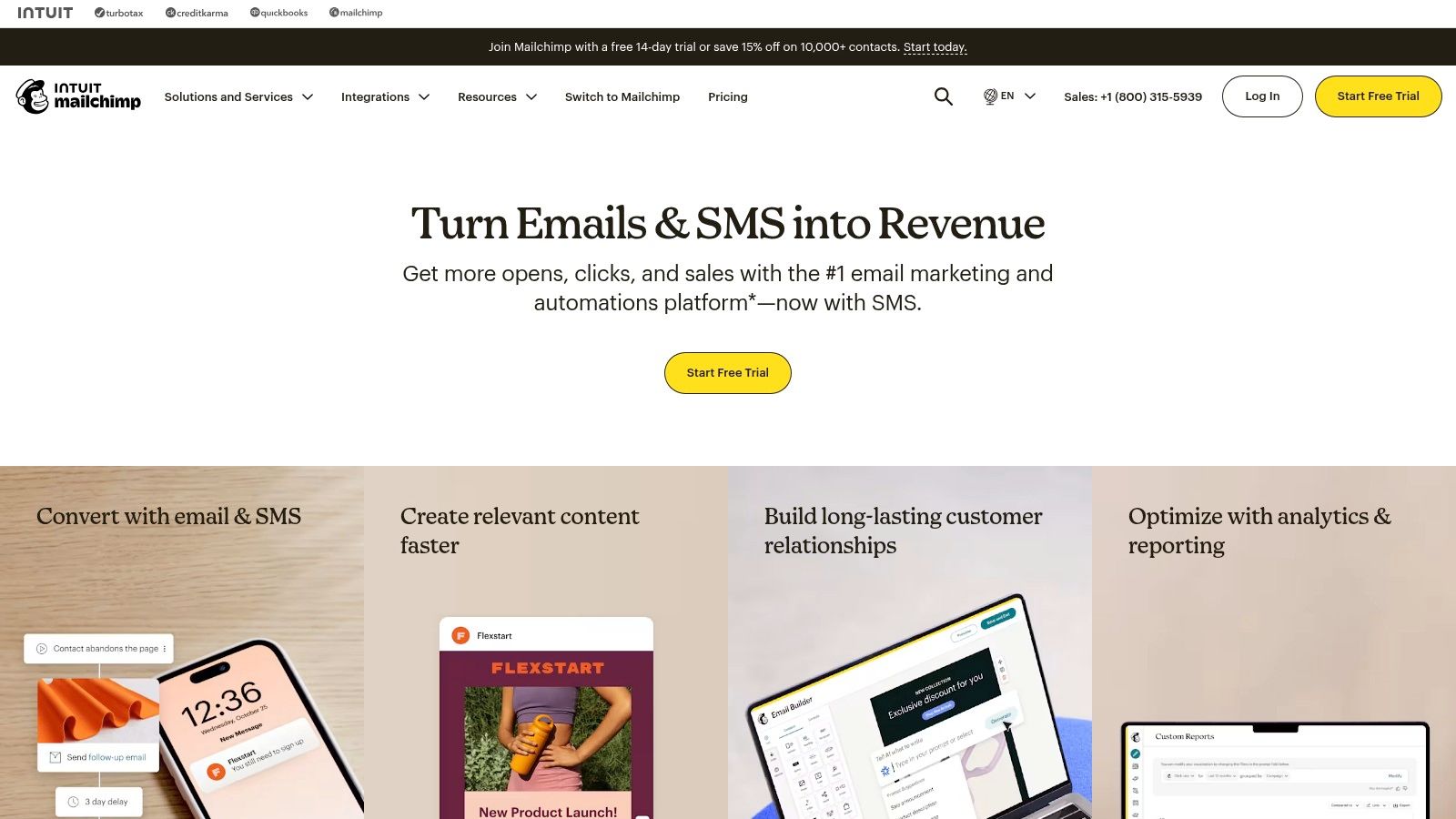
Unlike standalone AI copywriters, Mailchimp embeds its generative AI tools directly within the campaign-building workflow. This allows marketers to generate subject lines, email body copy, and even SMS messages on the fly, making it one of the best AI marketing tools for teams that need to create and send campaigns rapidly.
Key Features and Use Cases
- Generative AI Content: Quickly create on-brand copy for email subject lines and main content directly within the editor. The AI provides multiple variations, helping to overcome writer's block and speed up production.
- Customer Journey Builder: Automate marketing funnels with a visual workflow builder. The AI can help optimize send times and suggest logic paths to improve engagement based on user behavior.
- Use Case - SMB Email Campaign Launch: A small SaaS business can use Mailchimp's AI to generate five different subject lines for a new feature announcement. They can then set up an A/B test for those subject lines and use the AI-assisted content generator to draft the email body, launching a complete campaign in under an hour.
Pros & Cons
- Pro: The platform is exceptionally easy to get started with, thanks to its intuitive interface and a vast library of pre-built templates.
- Con: Key generative AI features and advanced automation tools are gated behind the paid Standard and Premium plans, limiting the free tier's utility.
Mailchimp is ideal for marketing teams seeking an all-in-one platform where AI assists directly in the creation and optimization of email and SMS campaigns. To maximize its value, upgrade to at least the Standard plan to unlock the generative AI capabilities.
Website: https://mailchimp.com
6. Hootsuite
Hootsuite integrates AI into its long-established social media management platform, making it one of the best AI marketing tools for teams that need to streamline content creation and scheduling. While known for its robust scheduling and analytics, the addition of OwlyWriter AI transforms it into a powerful content assistant. It's designed for brands looking to maintain a consistent, high-volume presence across multiple social networks without a massive time investment.
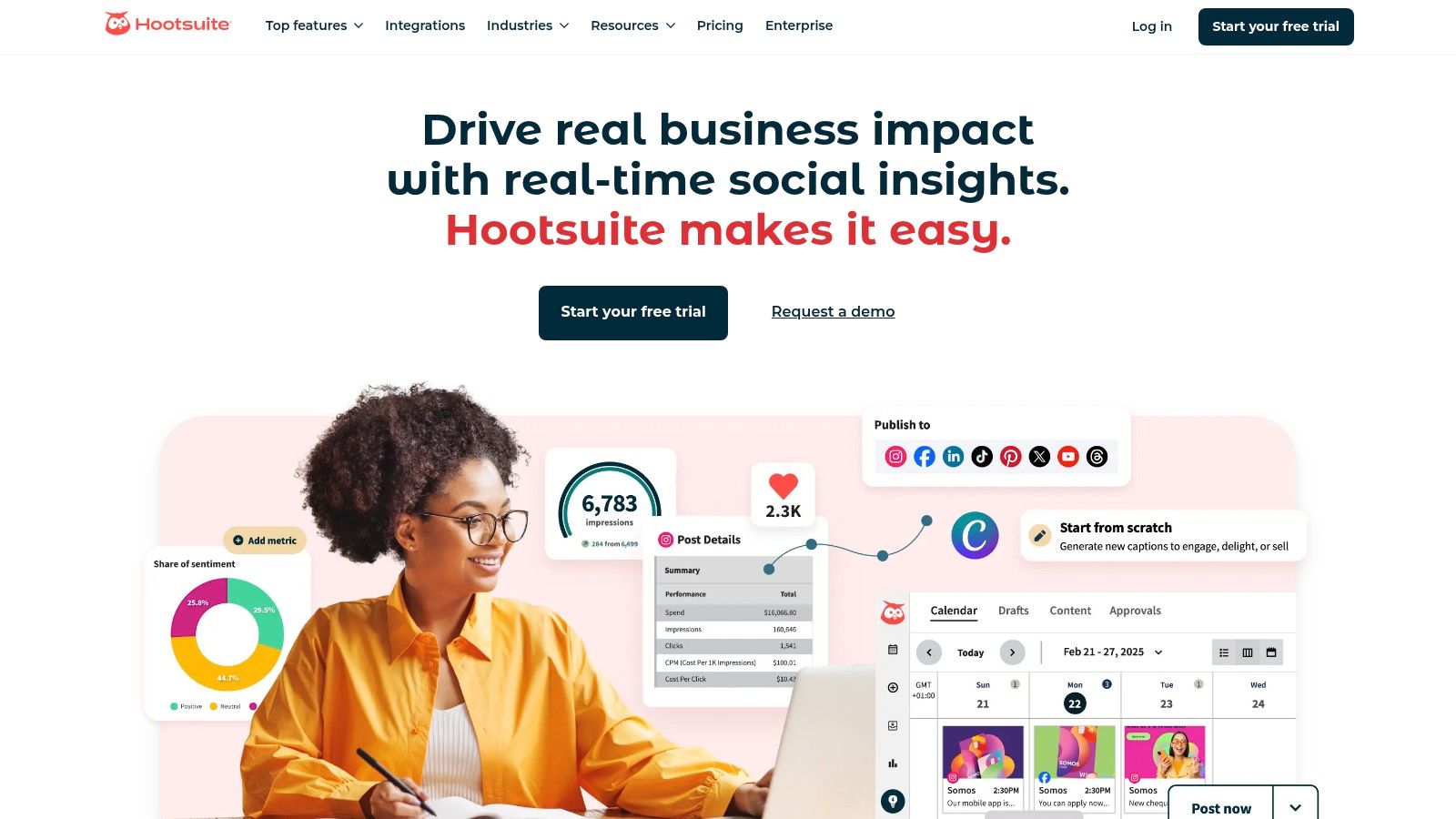
The platform's core value lies in centralizing social media operations, from planning and publishing to engagement and analysis. OwlyWriter AI enhances this by generating post ideas, captions, and hashtag suggestions directly within the content creation workflow. This combination of scheduling prowess and AI-driven content support makes it a comprehensive solution for busy social media managers.
Key Features and Use Cases
- OwlyWriter AI: An integrated AI content assistant that can generate captions from links, repurpose top-performing posts, and create new content ideas based on simple prompts.
- Cross-Network Publishing & Analytics: Schedule and publish content across all major social networks from a single dashboard and track performance with unified analytics reports.
- Use Case - Efficient Campaign Execution: A B2B SaaS company can use OwlyWriter to instantly generate five different caption variations for a new product launch announcement. The team can then schedule these posts across LinkedIn, Twitter, and Facebook for the entire week in a single session, all while tracking engagement from one unified inbox.
Pros & Cons
- Pro: A mature, well-established platform with excellent team collaboration features and a large ecosystem of third-party app integrations.
- Con: Pricing can be opaque, as final costs vary by region and are only shown at checkout. Some premium add-ons also incur separate monthly fees.
Hootsuite is ideal for marketing teams seeking an all-in-one social media management tool with a helpful AI assistant built-in. To leverage it effectively, explore how these AI features fit into your existing B2B social media marketing strategies.
Website: https://www.hootsuite.com
7. Salesforce Marketing Cloud
Salesforce Marketing Cloud is an enterprise-grade automation platform that leverages AI to orchestrate complex, data-driven marketing programs. It excels in environments where customer data is rich and multi-channel engagement is paramount, positioning it as one of the best AI marketing tools for scaled operations. Its AI, Einstein, assists with everything from predictive audience segmentation to optimizing campaign journeys.
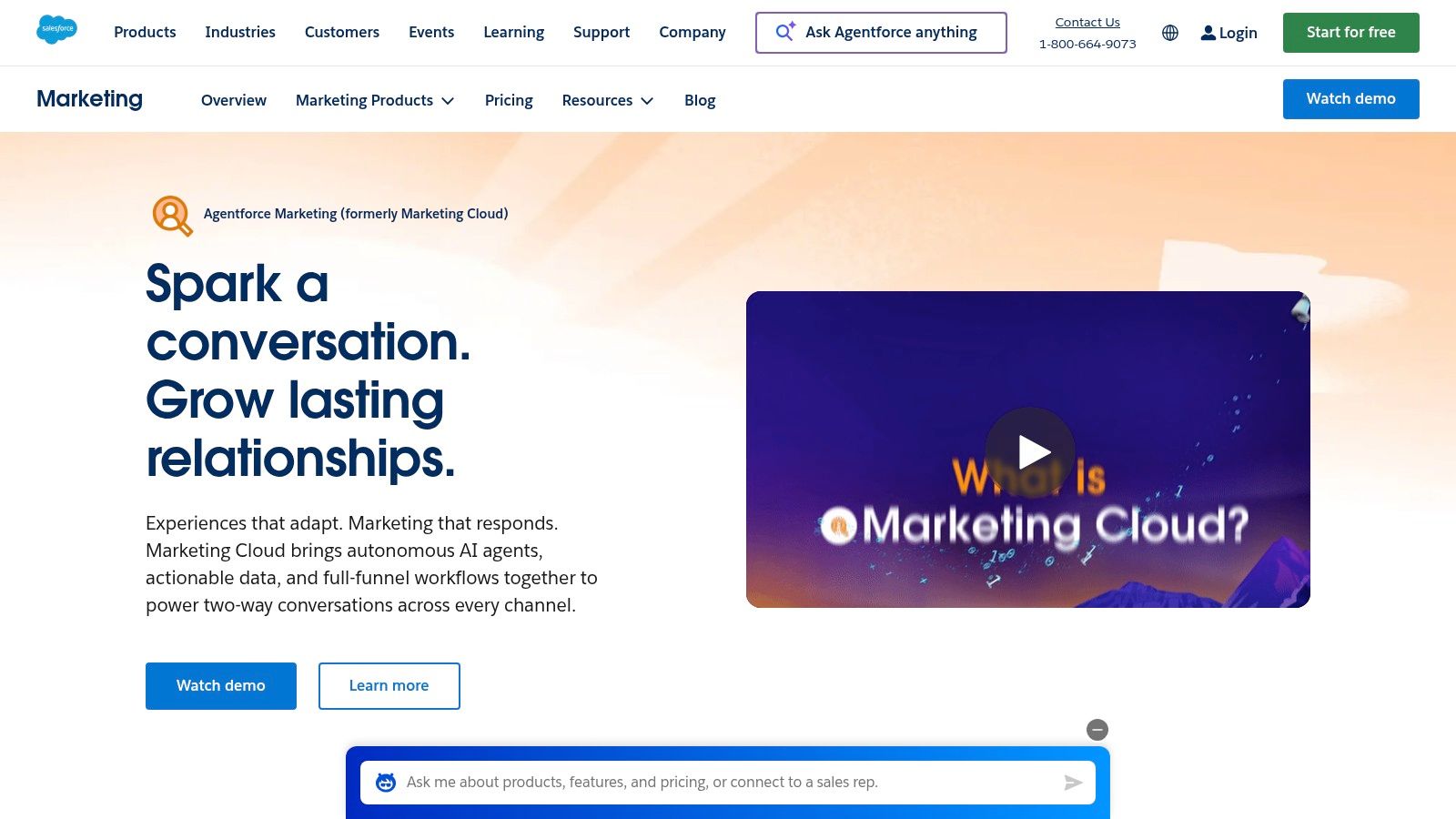
The platform's strength lies in its deep integration with the Salesforce CRM ecosystem. This native connection allows for a unified view of the customer, enabling highly personalized messaging across email, SMS, social, and advertising channels based on sales and service interactions, a feat many standalone tools struggle to achieve.
Key Features and Use Cases
- AI-Assisted Campaign Orchestration: Einstein AI provides predictive insights to help build and automate customer journeys, suggesting the next best action or message for individual contacts.
- Cross-Channel Personalization: Deliver consistent and personalized messaging across diverse channels, including email, mobile (SMS, push notifications), social media, and advertising platforms.
- Use Case - Enterprise Customer Retention: A large e-commerce company can use Marketing Cloud to analyze customer purchase history and engagement data. Einstein AI can then predict which customers are at risk of churning and automatically enroll them in a personalized re-engagement journey with targeted offers via email and SMS.
Pros & Cons
- Pro: Its comprehensive enterprise capabilities and tight integration within the Salesforce ecosystem provide an unmatched, unified customer view.
- Con: The platform requires a significant investment in both budget and implementation resources, making it less accessible for smaller businesses.
Salesforce Marketing Cloud is ideal for established organizations seeking a powerful, all-in-one solution to manage customer relationships at scale. To succeed, plan for a dedicated team to manage its setup and ongoing operations. For more on maximizing such a platform, review these marketing automation best practices.
Website: https://www.salesforce.com/marketing
8. Adobe Marketo Engage
Adobe Marketo Engage stands as an enterprise-grade marketing automation powerhouse, now infused with AI to streamline complex B2B and B2C campaign orchestration. It excels in managing the entire customer lifecycle, from initial lead capture to long-term advocacy, making it one of the best AI marketing tools for organizations focused on sophisticated, data-driven engagement and attribution.
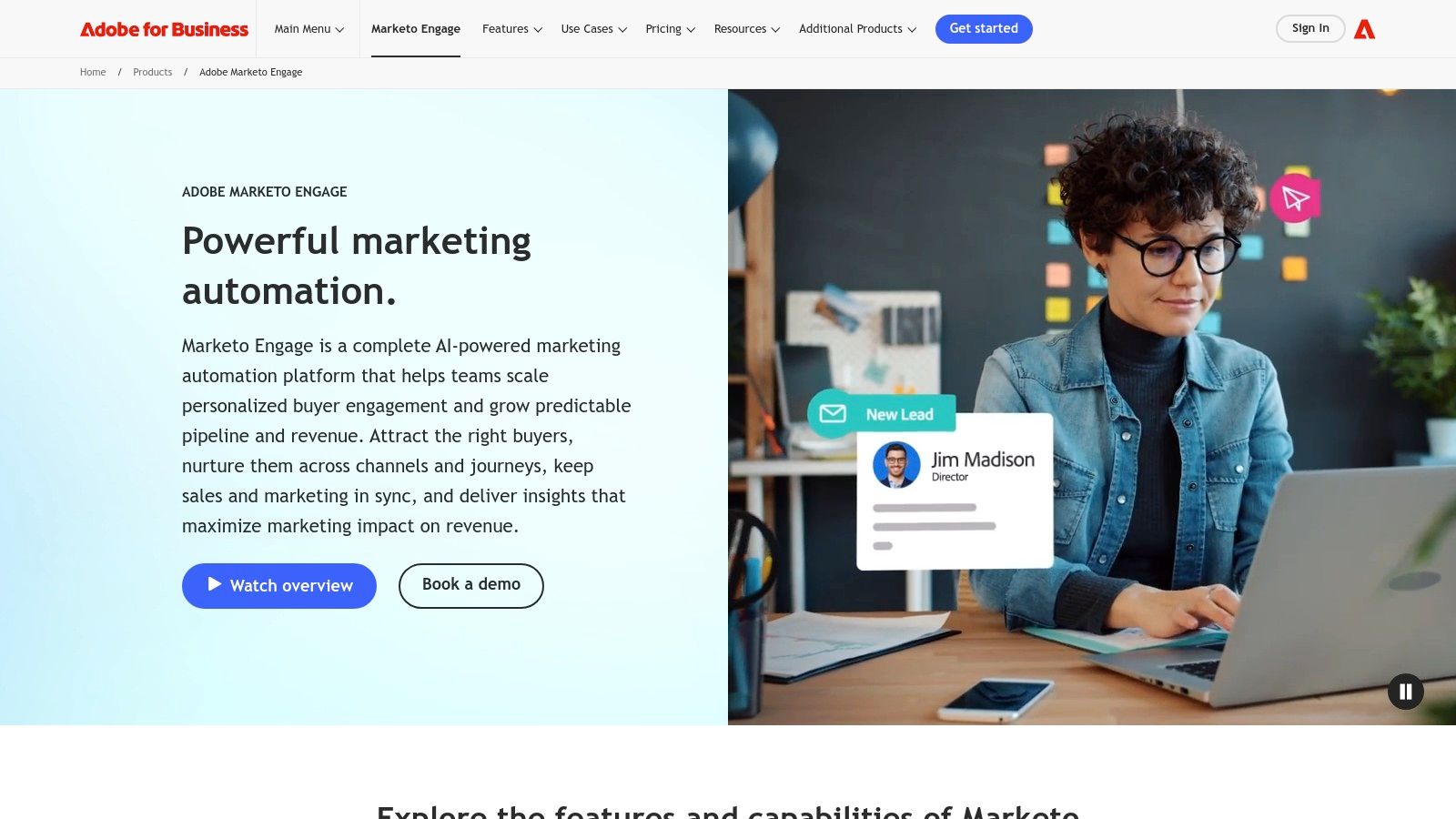
Unlike tools focused solely on content creation, Marketo's AI is deeply embedded into its core automation and analytics engine. Features like generative AI-powered email authoring and Dynamic Chat for conversational marketing are designed to enhance, not just automate, interactions across the buyer's journey, providing a level of personalization that scales.
Key Features and Use Cases
- Generative AI Authoring: Utilize AI to generate email subject lines, body copy, and entire layouts. This feature is integrated with Adobe Firefly for quick access to commercially-safe, AI-generated images.
- Dynamic Chat: Deploy AI-powered chatbots on your website that can engage visitors with generative replies, qualify leads, and book meetings directly, personalizing conversations based on visitor data.
- Use Case - Enterprise Lead Nurturing: A global B2B tech firm can use Marketo to automate complex, multi-touch nurture streams. The AI helps generate email variations for A/B testing, while advanced scoring and journey analytics identify the most engaged accounts for sales handoff.
Pros & Cons
- Pro: Offers rich enterprise automation with highly advanced lead scoring, journey building, and revenue attribution capabilities.
- Con: The platform's complexity and quote-only pricing model can create a significant barrier to entry for smaller businesses.
Marketo is ideal for established marketing teams that require a robust, integrated platform for managing intricate marketing operations at scale. Its power lies in its deep integration within the Adobe Experience Cloud and its advanced analytics.
Website: https://business.adobe.com/products/marketo
9. Klaviyo
Klaviyo solidifies its place as one of the best AI marketing tools for e-commerce and direct-to-consumer (DTC) brands, particularly those built on platforms like Shopify. It leverages AI not just for content creation but to power hyper-personalized customer journeys through email and SMS, turning customer data into predictive insights for targeted campaigns. Its primary differentiator is its deep integration with e-commerce ecosystems.
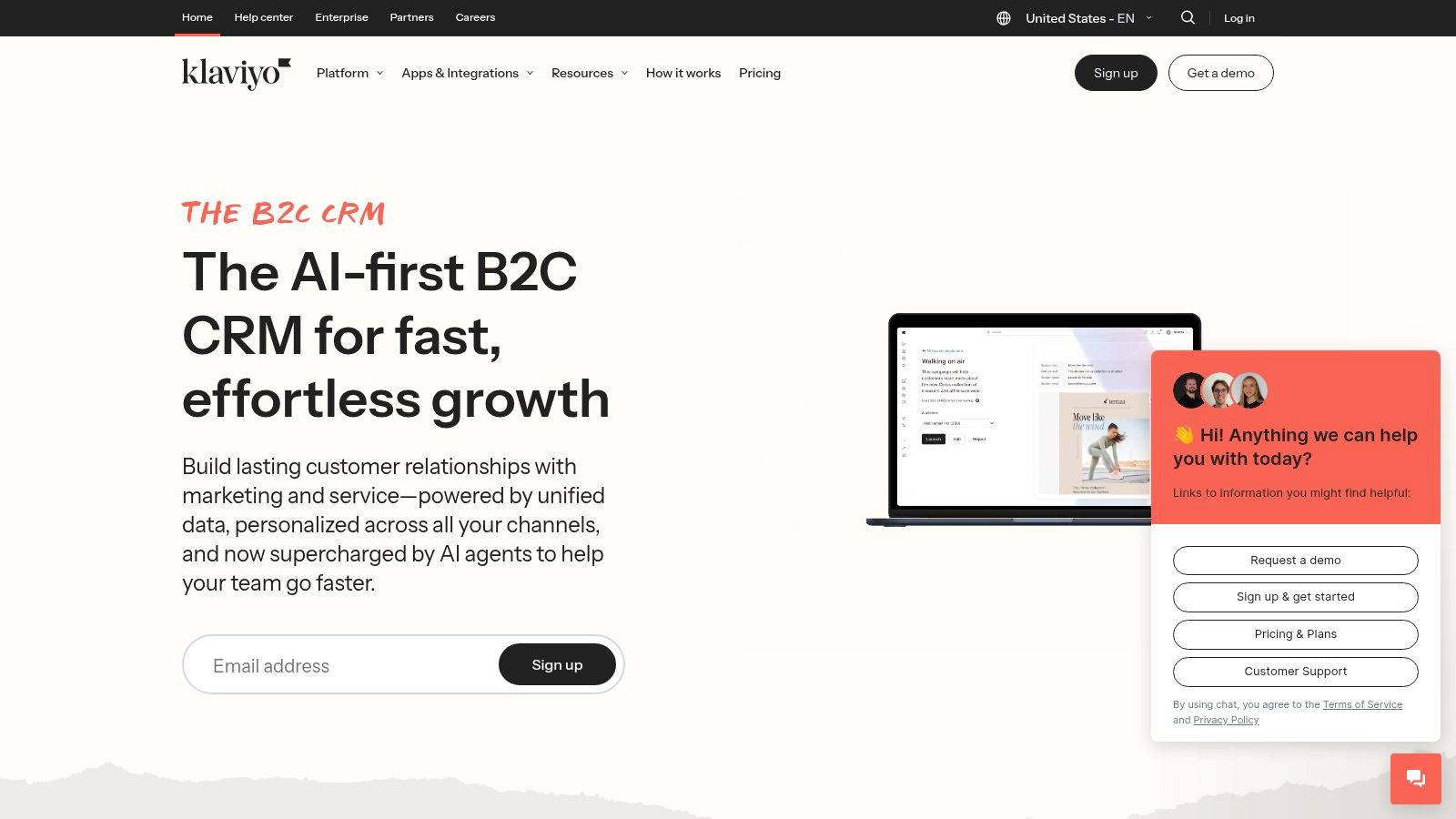
Unlike more general marketing automation platforms, Klaviyo’s AI is specifically trained on massive volumes of e-commerce data. This allows it to generate highly relevant product recommendations, predict future purchase dates, and segment audiences with a level of precision that drives higher conversion rates and customer lifetime value.
Key Features and Use Cases
- Generative AI & Predictive Analytics: Automatically generates subject lines, SMS copy, and entire email campaigns. Its predictive models can forecast churn risk, expected order date, and lifetime value for smarter segmentation.
- Deep E-commerce Integration: Seamlessly syncs customer data, order history, and browsing behavior from platforms like Shopify, enabling highly personalized and automated marketing flows like abandoned cart reminders.
- Use Case - Personalized Upselling: A DTC apparel brand can use Klaviyo to automatically send a post-purchase email featuring AI-generated product recommendations that complement a customer's recent order, increasing the likelihood of a repeat purchase.
Pros & Cons
- Pro: The tight integration with Shopify and other e-commerce platforms is unparalleled, making data synchronization and automation incredibly powerful.
- Con: Pricing can become expensive as your contact list and messaging volume grow, and the most advanced AI service tools come at an additional usage-based cost.
Klaviyo is an ideal choice for e-commerce businesses aiming to leverage AI for data-driven, personalized communication. For maximum impact, connect all your data sources to give the AI a complete picture of the customer journey.
Website: https://www.klaviyo.com
10. Shopify App Store (AI Marketing category)
While not a single tool, the Shopify App Store is an essential resource for e-commerce businesses looking to leverage AI in marketing. It serves as a curated marketplace of thousands of vetted applications, many of which use AI to solve specific marketing challenges, from ad optimization to customer service. This ecosystem approach allows merchants to find highly specialized solutions that integrate directly into their store's backend.
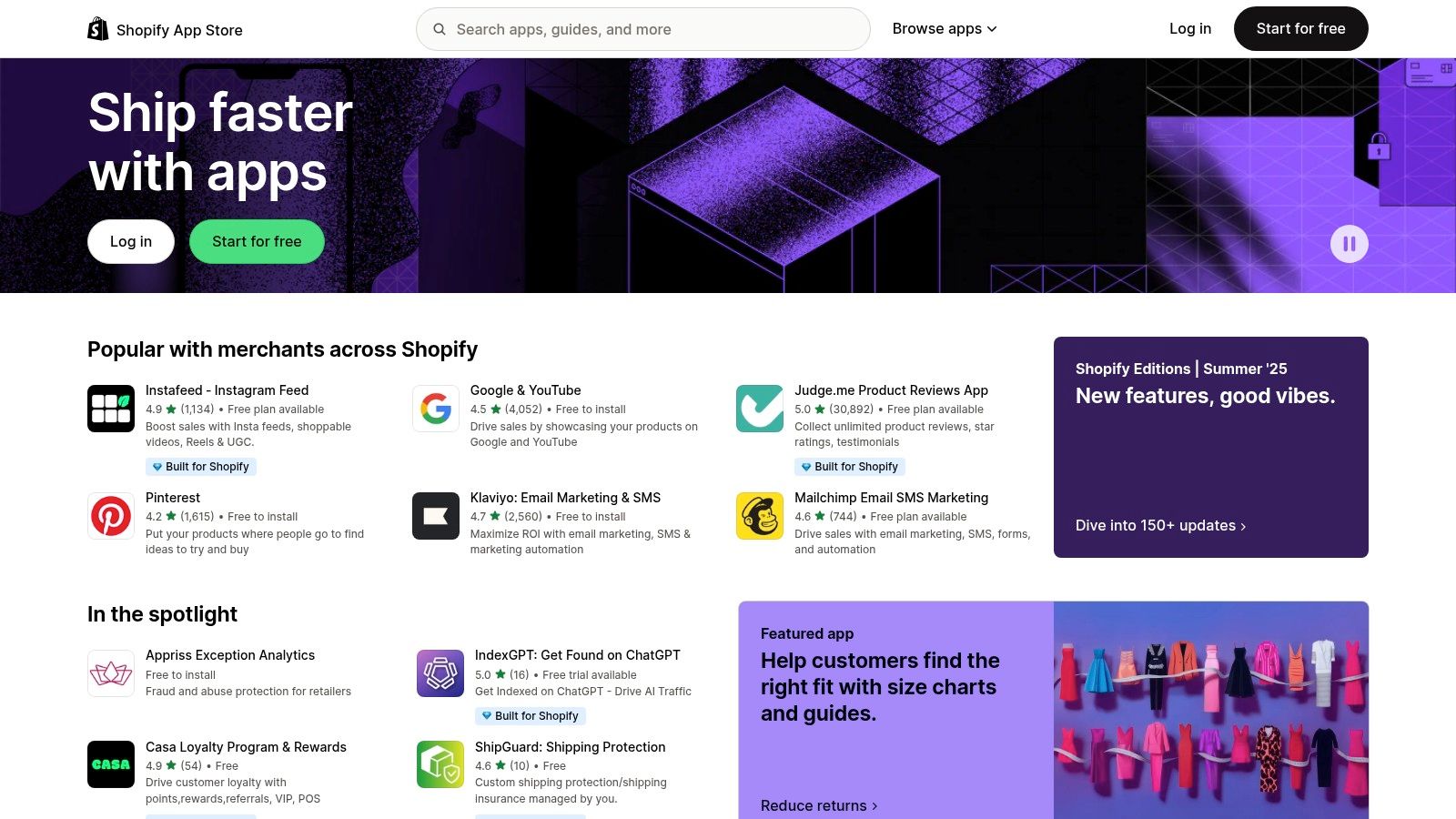
Unlike standalone AI platforms, the strength of the App Store lies in its native integration. Apps can access Shopify data to personalize campaigns, automate workflows, and provide data-driven insights with minimal setup. Furthermore, Shopify is increasingly embedding its own AI features, like Shopify Magic for product descriptions and the Sidekick assistant, making the platform itself one of the best AI marketing tools for e-commerce.
Key Features and Use Cases
- Vast App Selection: Discover and install AI-powered apps for SEO, email marketing, chatbot automation, ad management, and review generation, all with user ratings.
- One-Click Installation: Apps are installed directly into your Shopify dashboard, with billing conveniently managed through your Shopify subscription.
- Use Case - E-commerce Personalization: A Shopify store owner can install an AI-driven product recommendation app that analyzes customer behavior to display personalized suggestions, boosting average order value. Another app might automate the creation of product descriptions and blog posts tailored to SEO keywords relevant to their niche.
Pros & Cons
- Pro: The deep integration into Shopify workflows and data provides a seamless user experience that standalone tools cannot match.
- Con: The quality and support for third-party apps can be inconsistent, and reliance on multiple apps may lead to higher cumulative costs.
The Shopify App Store is the go-to destination for merchants seeking to enhance their marketing efforts with AI. For best results, carefully read user reviews and test apps using their free trial periods before committing.
Website: https://apps.shopify.com
11. G2
While not an AI tool itself, G2 is an indispensable B2B software marketplace for discovering and comparing the best AI marketing tools. It serves as a crucial starting point for any SaaS team's research process, offering a comprehensive landscape of available solutions backed by verified user reviews. Its structured categories and comparison grids cut through marketing hype, allowing you to evaluate tools based on real-world user satisfaction.
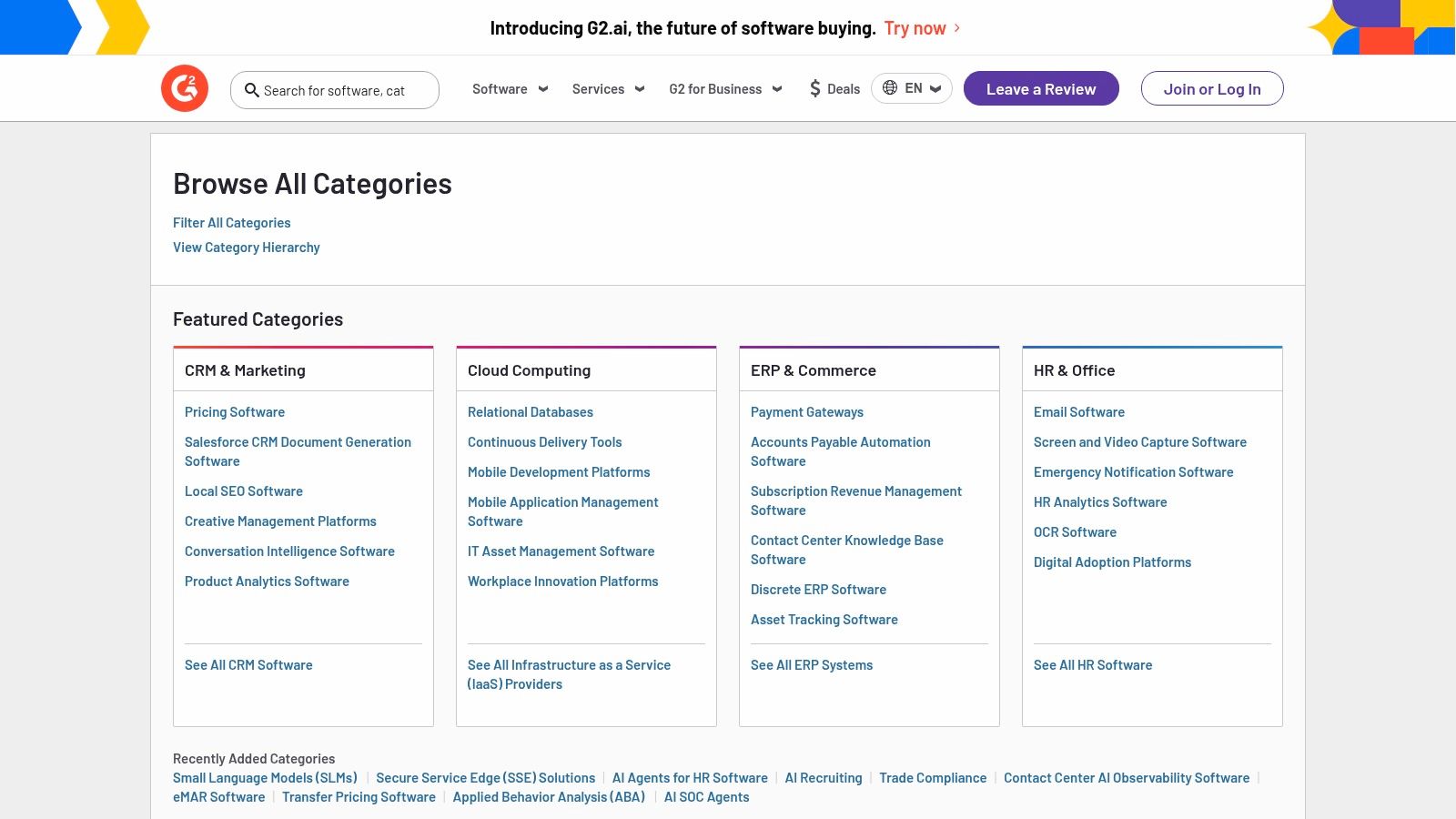
G2 excels at organizing the rapidly expanding AI software market into understandable segments like AI content generation, marketing analytics, and automation. This makes it easier to find and shortlist vendors that match your specific needs, company size, and existing tech stack.
Key Features and Use Cases
- Comparison Grids: Directly compare up to four different tools side-by-side, evaluating them on features, user ratings, and pricing information to accelerate decision-making.
- Emerging AI Categories: G2 frequently adds new categories for niche and agentic AI software, helping marketing teams stay ahead of the curve and discover innovative solutions.
- Use Case - Shortlisting New Tools: A marketing operations manager can use G2’s filters to find all AI personalization engines that integrate with HubSpot and have a user rating of 4.5 stars or higher. This quickly narrows down dozens of options to a handful of qualified vendors for demos.
Pros & Cons
- Pro: The platform’s broad vendor coverage and up-to-date AI software taxonomy are unparalleled, providing a complete market overview.
- Con: Some user reviews may be influenced by vendor incentives, so it's wise to read a variety of opinions for a balanced view.
G2 is the definitive resource for validating your AI marketing tool choices against peer experiences. To use it effectively, focus on the most recent reviews and leverage the detailed feature filters to create a highly relevant shortlist before engaging with sales teams.
Website: https://www.g2.com/categories
12. Capterra
While not an AI tool itself, Capterra is an indispensable resource for discovering, comparing, and validating the best AI marketing tools for your specific needs. As a Gartner-owned software directory, it provides a structured and comprehensive landscape of available solutions, moving beyond vendor marketing claims to offer peer-driven insights and detailed feature breakdowns.
Its primary value lies in its robust filtering and comparison engine. Instead of navigating dozens of individual websites, marketers can build a shortlist of tools based on specific criteria like features, business size, and user rating, then compare them side-by-side. This methodical approach saves significant research time and helps ensure you choose a tool that truly fits your workflow and budget.
Key Features and Use Cases
- Advanced Filtering & Comparison: Narrow down hundreds of AI tools by specific features (e.g., "brand voice," "predictive analytics"), target industry, or company size to find the most relevant options.
- Verified User Reviews: Access authentic feedback from real users, providing practical insights into a tool's strengths, weaknesses, and real-world performance that you won't find on a pricing page.
- Use Case - Building a MarTech Stack: A marketing manager can use Capterra to find and compare three top-rated AI-powered email automation platforms. They can filter for tools that integrate with their existing CRM, read reviews about customer support, and create a comparison report to present to stakeholders, streamlining the procurement process.
Pros & Cons
- Pro: The extensive library of verified user reviews offers an honest, ground-level view of a tool's performance and customer support quality.
- Con: Vendor listing prominence can be influenced by pay-per-click advertising, so it's wise to sort by user rating or other neutral factors.
Capterra is the ideal starting point for any team looking to invest in new AI marketing software. Use it to build an initial shortlist, then visit vendor websites directly to verify pricing and request demos. This two-step process ensures a well-rounded and informed purchasing decision.
Website: https://www.capterra.com
Top 12 AI Marketing Tools Feature Comparison
How to Choose and Implement the Right AI Marketing Tools
Navigating the expansive landscape of AI marketing tools can feel overwhelming, but this curated list demonstrates a clear trend: AI is no longer a futuristic concept but a fundamental component of modern B2B SaaS marketing. We've explored everything from comprehensive platforms like HubSpot Marketing Hub and Salesforce Marketing Cloud to specialized powerhouses like Jasper for content generation and Semrush for SEO intelligence. The key takeaway is that the best AI marketing tools are those that align precisely with your unique challenges and strategic goals.
Rather than searching for a single "magic bullet" solution, the most effective approach is to build a synergistic tech stack. Your goal should be to create an ecosystem where data flows seamlessly between platforms, providing a unified view of the customer journey and empowering your team with actionable, AI-driven insights.
Your Roadmap to Successful AI Implementation
Selecting the right software is only half the battle; successful adoption is what unlocks true ROI. A haphazard implementation can lead to wasted resources, frustrated teams, and underutilized features. To ensure a smooth transition and maximize your investment, follow this strategic framework.
- Audit Your Current Stack and Identify Gaps: Before you even look at new tools, map out your existing marketing technology. Where are the bottlenecks? Are you struggling with content velocity, lead qualification, personalization at scale, or analyzing campaign data? Pinpointing these specific pain points will give your search a clear focus.
- Prioritize Seamless Integrations: A powerful AI tool that doesn't communicate with your CRM or analytics platform will create data silos, undermining its own value. Look for native integrations or robust API support (like Zapier compatibility) to ensure your new tool becomes a cohesive part of your workflow, not an isolated island.
- Leverage Free Trials and Pilot Programs: Never commit to a long-term contract without hands-on testing. Use free trials to evaluate the user interface, test core features against your specific use cases, and gauge the quality of customer support. Run a small-scale pilot project with a single team to measure tangible results and gather internal feedback before a full-scale rollout.
- Master Foundational Principles: AI amplifies your strategy, it doesn't replace it. To get the most out of these sophisticated platforms, your team needs a strong understanding of core marketing principles. For instance, successfully deploying tools like Marketo or Klaviyo requires a solid grasp of marketing automation best practices to build effective, intelligent workflows.
Final Thoughts: Building Your Future-Proof Marketing Engine
The journey to finding the best AI marketing tools for your B2B SaaS company is an ongoing process of evaluation, testing, and optimization. The market is evolving rapidly, and the tools that define success today will continue to advance tomorrow. Platforms like G2 and Capterra are invaluable for keeping a pulse on user sentiment, while niche solutions like the Shopify App Store can reveal innovative tools for specific e-commerce challenges.
By adopting a strategic, needs-based approach to selection and a methodical, phased approach to implementation, you can build a powerful, future-proof marketing engine. This AI-powered stack won't just automate repetitive tasks; it will uncover new growth opportunities, deliver deeply personalized customer experiences, and ultimately position your brand as a definitive authority in its niche. The future of marketing is intelligent, and with the right tools, you can lead the charge.
Ready to conquer emerging channels and optimize your content for the AI era? PimpMySaaS specializes in helping B2B SaaS companies leverage platforms like Reddit and master LLM optimization. Discover how our targeted expertise can complement your new AI toolkit and drive unparalleled growth by visiting PimpMySaaS.
